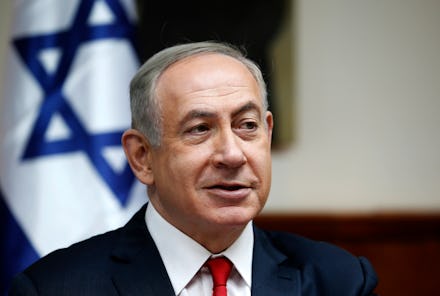For the first time in more than two decades, the Israeli government approved a settlement

After more than 20 years, the Israeli government has approved the construction of a new state settlement — a controversial move, as international law deems such settlements illegal, Al Jazeera reported.
A unanimous vote from Israel's Security Cabinet made way for the construction near Emek Shilo, just north of Ramallah in the West Bank. According to CNN, the new settlement is reserved for Israelis evicted from the Amona settlement, which was built on private Palestinian land. The Security Cabinet also approved the construction of 2,000 homes within established settlements, a plan that had been in the works for months before Thursday's vote.
The administration of President Donald Trump has offered contradictory stances on the issue of settlements, with the White House first issuing a statement claiming settlements "may not be helpful," but they're not "an impediment to peace." More recently, Trump did an about-face, indicating settlements are not, in fact, "good for peace." And during a meeting at the White House in February, Trump asked Israeli Prime Minister Benjamin Netanyahu to temporarily halt building settlements, the New York Times reported.
As a "goodwill gesture," Netanyahu shared the new settlement construction guidelines with Trump. White House officials later said the Israeli prime minister was not violating Trump's request to stop building settlements, as the plans predated his meeting with Netanyahu.
"Out of consideration to President Donald Trump's position, Israel will take necessary steps to minimize the expansion of developed area beyond the footprint of existing settlements in Judea and Samaria [the occupied Palestinian territories] and exhibit considerable restriction to allow the progression of the peace process," Netanyahu said in a statement Friday, according to the Guardian.
"Israel will build within the existing developed area, as much as possible," Netanyahu continued. "In areas where this is not possible, Israel will build along the existing development line. In areas where neither of these possibilities are feasible, due to legal, security, topographical or additional concerns, Israel will allow building in proximity as close as possible to the existing development line."
The United Nations Security Council condemned the building and existence of settlements in Palestinian territory in December, when it passed the historic resolution 2334 in a unanimous vote. The United States abstained, reflecting a less tolerant approach to Israeli expansion under former President Barack Obama's administration. The U.N. Security Council argued settlements have "no legal validity, constituting a flagrant violation under international law and a major obstacle to the vision of two states living side-by-side in peace and security, within internationally recognized borders."
On Thursday, the Palestine Liberation Organization — Palestine's main political party, which currently controls the West Bank — decried Netanyahu's plans.
"Israel's policies remain unchanged as Prime Minister Benjamin Netanyahu and his extremist, racist coalition government continue to persist with their systematic policies of settler colonialism, apartheid and ethnic cleansing, showing a total and blatant disregard for Palestinian human rights, independence and dignity," PLO Executive Committee member Hanan Ashrawi said in a statement, CNN reported.
"Today's announcement once again proves that Israel is more committed to appeasing its illegal settler population than to abiding by the requirements for stability and a just peace," she continued.
Thursday's settlement announcement was also made on Land Day, a day on which Palestinians commemorate the 1976 deaths of six peaceful Palestinian protesters killed by Israeli security forces.
The United States' objections to settlements don't undermine its support for Israel, Samantha Power, then-U.S. ambassador to the U.N., said of resolution 2334 in December.
"Our vote today does not in any way diminish the United States' steadfast and unparalleled commitment to the security of Israel," Power said.
But she did express concern over the impact of settlements on the Middle East peace process, adding: "This resolution reflects trends that will permanently destroy the hope of a two-state solution if they continue on their current course."